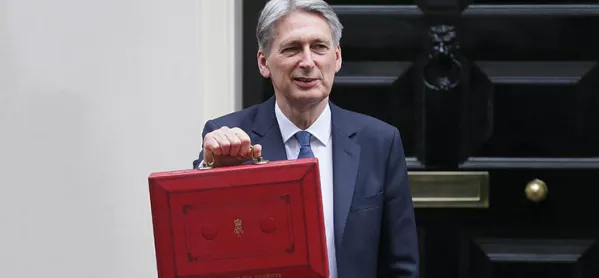In John Bew’s magisterial biography of Prime Minister Clem Attlee, we gain a vivid insight into a politician who defied both critics and expectations.
Attlee’s qualities contrasted starkly with his predecessor, Winston Churchill. Charisma was replaced by overpowering ordinariness. The Daily Mail lamented that it was “an age of understudies”.
Yet Attlee led the government that would boost Britain’s post-war economy, introduce the National Health Service, and unleash the physical and emotional rebuilding of Britain with an ambition that was simply breathtaking.
In yesterday’s Budget, I suspect lots of us were hoping that chancellor Philip Hammond’s cautious demeanour concealed a similar sense that, in these wayward times, there was a vision for reconfiguring Britain.
It didn’t happen.
Instead of leadership, it felt like managerialism. In education, maths took centre stage. There was more money to expand maths mastery programmes and new maths schools. And a plan to give schools and colleges £600 for every extra pupil who decides to take maths or further maths A levels, or core maths.
This is potentially problematic as it runs the risk of creating a perverse incentive to enter students on maths courses when this might not be the best option for them.
And if the allocation is only for extra maths students - as the wording suggests - it is pretty unfair on all those institutions who have already worked hard over the past few years to increase maths entries.
With 16-19 funding levels at such a low ebb, we’re bound to welcome any investment and we’ll talk to the DfE about how we make this plan work.
But it would have been far better to increase the level of funding per student in general, where the money would have helped sixth forms and colleges in all subjects.
In the brief section on education, there was also funding to increase the number of computer science teachers, and a small allocation to support the introduction of T levels.
And that was about it.
Missing vision
On the hugely important issue of teachers’ pay - which has fallen significantly in real terms over the past seven years because of successive pay freezes and pay caps - there was nothing in the speech itself.
Buried in the Budget Red Book, however, was a reference to the government’s intention of moving away from the 1 per cent public sector pay cap, and a statement about it being up to pay review bodies to make recommendations and secretaries of state to make final decisions.
Crucially, however, there is no extra government core funding for schools and colleges - and as they are having to cut budgets they will obviously not be able to afford any significant increase. So, we appear to be back to square one.
What was missing from the Budget was not only funding, but also vision. There was no apparent correlation between a series of piecemeal announcements and an over-arching strategy for education.
Yes. It was vaguely framed under the narrative of a technological revolution. And nobody will argue with the importance of maths and other Stem subjects.
But where is the broader vision of how we take the next step in our education system to close those obdurate attainment gaps between rich and poor? To make sure that every young person leaves the education system with the knowledge, qualifications and skills that will equip them for a career and the demands of life in the 21st century?
We are not expecting the Budget to map out that strategy. That’s not its job. But what we could and should expect is the broad brush strokes of how public spending will help shape such a vision.
Instead, one cannot help feeling that there is a void. That the government’s pre-occupation with Brexit is creating a policy vacuum. That is understandable to a degree. Brexit is the issue of our time.
But the education system that we create over the next few years, and the decisions we take now, will be pivotal to our success in a future beyond Brexit - just like those decisions by Clem Attlee’s government for the brave new world of post-war Britain.
Such combined lack of funding, vision, and policy in the Autumn Budget is not an inspiring start.
Geoff Barton is general secretary of the Association of School and College Leaders. He tweets @RealGeoffBarton.
Want to keep up with the latest education news and opinion? Follow Tes on Twitter and Instagram, and like Tes on Facebook




